
THE name of veteran journalist and Rappler CEO Maria Ressa evokes both pride and fury among Filipinos in the world, depending on which lens they are wearing as they look at what’s happening in the Philippines, especially during the presidency of Rodrigo Duterte.
Maria Ressa is a multi-awarded Filipino American journalist and author who co-founded the online news organization Rappler and became its chief executive officer.
Ressa was born to Filipino parents in Manila and relocated at the age of 10 with her parents who relocated to Toms River, New Jersey. She graduated cum laude at Princeton University and was awarded a Fulbright Fellowship to study political theater at the University of the Philippines Diliman.
I first knew about Maria when she co-founded independent production company Probe in 1987, along with Cheche Lazaro, my former professor and chairman of the Department of Broadcast Communication of the University of the Philippines’ College of Mass Communication, where I graduated and worked as an instructor before I became active in the broadcasting industry in Manila.
Maria also served as CNN’s bureau chief in Manila until 1995, and eventually ran the network’s Jakarta bureau from 1995 to 2005, where she specialized in investigating terrorist networks.
I personally worked with Maria when I was already anchoring the news for ABS-CBN’s The Filipino Channel’s daily newscast “Balitang America.” She was director of ABS-CBN News from 2004-2010 and was replaced by my colleague Ging Reyes, former News Bureau Chief of ABS-CBN’s North America Bureau when Maria decided not to renew her contract.
Maria Ressa established the online news site Rappler in 2012. Rappler is a pioneering online news portal in the Philippines and has received numerous local and international awards. Maria and Rappler’s most recent and notable awards were:
– November 2017, Ressa, as the CEO of news organization Rappler: 2017 Democracy Award by the National Democratic Institute to three organizations at its annual Democracy Award Dinner in Washington, D.C., entitled “Disinformation vs. Democracy: Fighting for Facts”
– June 2018: Ressa was the recipient of the World Association of Newspapers’s Golden Pen of Freedom Award for her work with Rappler
– December 2018: Ressa was included in Time’s Person of the Year 2018, as one of “The Guardians”, a collection of journalists from around the world combating the “War on Truth”. Ressa is the second Filipino to receive the title after former President Corazon Aquino in 1986.
– April 2019: Ressa was included in Time’s 100 Most Influential People in the World
– May 2019: Ressa won the Columbia Journalism Award from the Columbia University Graduate School of Journalism, the school’s highest honor, “for the depth and quality of her work, as well as her courage and persistence in the field.”
– June 2019: Ressa received the Canadian Journalism Foundation’s Tribute honour, which recognizes a journalist who has made an impact on the international stage
– October 2019: Ressa was named in the list of BBC 100 Women
ALL OF THESE achievements and awards did not earn the trust and respect of President Rodrigo Duterte’s allies and supporters.
On social media, they are furious about Ressa, calling her fake news queen and saying she deserves to be in jail along with another Duterte critic, Senator Laila de Lima. They would always post as “proof” Ressa mistakenly stating in an interview with ABC News Australia that ABS-CBN has 11 million employees who will suffer as a result of the shutdown of the network [instead of 11 thousand]. Maria later apologized for this error.
For them, the guilty verdict handed down by Manila court Judge Rainelda Estacio-Montessa on the cyber libel case against Ressa, and former Rappler reporter Rappler Reynaldo Santos Jr. is a reason to celebrate, especially after this verdict followed the shutdown of ABS-CBN Broadcasting Corporation just a few weeks ago.
For Duterte, his allies and supporters, this decision is justice at work, and a vindication for all the critical reporting of both Rappler and ABS-CBN of President Duterte, especially when it comes to his war on drugs and his alliance with the Chinese government. The Duterte adminstration, and especially the president himself, had been very vocal against both news organizations [plus Philippine Inquirer], and had made multiple efforts to threaten their closure both judicially and extra-judicially.
For those in the Duterte camp, such relentless critical reporting is fake news and politically motivated, and not an exercise of the free and independent press’ sacred obligation to hold the country’s public officials accountable, especially the president, whose position has been accorded by the Constitution power and public trust that when abused, may again subject the Filipino people to the oppression and tyranny of the Marcos dictatorship.
The Duterte administration has called the public to respect the court’s decision and maintained that Duterte “has never been behind any effort to curtail press freedom in the country.” They contended that this was a case filed by a private citizen who was aggrieved by Rappler and the president does not have a hand on it.
But according to an October 2019 report by Rappler, “Duterte gives Wilfredo Keng’s daughter a government post…Patricia C. Keng is appointed member of the Philippine Commission on Women by President Rodrigo Duterte, who claimed he did not know her father, the businessman who filed a cyber libel case against Rappler.”
“In an email to Rappler on Tuesday, October 8, PCW confirmed that the ‘Patricia Anne C. Keng’ named PCW member is the same Patricia Keng who ran as a nominee of the Wow Pilipinas party list in the May 2019 elections. This Patricia Keng is the daughter of Wilfredo Keng, as he said in a September 18 affidavit.”
Cyber libel case vs Rappler
As ABS-CBN News online reported, Rappler CEO Maria Ressa was on Monday, June 15 found guilty of cyber libel over a 2012 article that linked a businessman to alleged illegal activities. In a report before the guilty verdict, Ressa said in jest, “Essentially, if we do lose the case, it would be because someone in Rappler fixed a typo.”
The article in question was published on May 29, 2012 — less than four months BEFORE Republic Act No. 10175 or the Cybercrime Prevention Act was signed into law on September 12, 2012 by former President Benigno “Noynoy” Aquino.
In indicting Ressa, Santos and Rappler in February 2019, the Department of Justice (DOJ) admitted the 2012 article is not covered by the Cybercrime Prevention Act of 2012, which punishes cyber libel with a heavier penalty.
However, the DOJ argued that when the 2012 article was “republished” in February 2014, it became subject to the new Cybercrime law with the correction of the typographical error: from “evaTion” to “evaSion.”
To understand this cyber libel case, let me share with you how ABS-CBN explained and reported just before the verdict came out:
Malice is an essential element of libel.
The general rule under the Revised Penal Code is that “Every defamatory imputation is presumed to be malicious, even if it be true, if no good intention and justifiable motive for making it is shown.”
But it provides for 2 exceptions: a private communication in the performance of a legal, moral or social duty; and a fair and true report, in good faith, without any comments or remarks.
The defense said the article was a “fair and true report without any additional personal defamatory statements” and that they merely quoted an intelligence report and a report from the Philippine Star.
But the prosecution said the intelligence report cited was “unconfirmed” and Mr. Keng was not asked about his supposed involvement in murder, human trafficking, sale of illegal drugs or illegal smuggling.
They also took issue with the statement: “The document also said Keng was involved in a murder case for which he was ‘never jailed.’ It could be referring to the death of Manila Councilor Chika Go in 2002 where Keng had been identified as a mastermind.” The last sentence, they said, is a comment and not a fair and true report.
The prosecution also said Rappler did not take down the story and did not publish a new story based on Keng’s evidence.
The defense said an article was drafted but due to an editorial decision, the subsequent article was not published. They also said Keng’s side was published in the published article.
The judge convicted Ressa and Santos but not Rappler. They could face between six months and six years in prison and must also pay almost $8,000 in damages, the court ruled. After handing down the guilty verdict, Judge Rainelda Estacio-Montesa said “freedom of the press could not be used as a “shield”. As Reuters reported, “the court ruling said Rappler showed “actual malice” for not publishing at least a clarification after Keng complained.
Ressa and Santos will remain on bail they previously posted and have been given 15 days to consider their next move, according to their counsel, former Supreme Court spokesman Theodore Te, in the ABS-CBN News report.
“Obviously legal steps forward would include questioning the decision and the appropriate proceeding. We still have to meet, we’ll have to go over the decision carefully,” he said.
Rappler issued a statement after the verdict:
This decision is historic. It was handed down during a pandemic, with community quarantine restrictions still in place. It is the first verdict on one of the many court cases lodged against Rappler since President Rodrigo Duterte became president in 2016. It comes just 3 days after the country commemorated its 122nd year of independence. And it convicts a journalist, Maria Ressa – among TIME Magazine’s 2018 Person the Year awardees – and a former researcher-writer Rey Santos Jr over a case built on flimsy ground: a corrected typographical error.
They used it as basis to make an incredible claim about “republication” of an article that was, in truth, published before the cybercrime law was enacted. This creative reinterpretation and twisting of the law became grounds to prosecute this case, filed 5 long years after the publication of a story about the late former chief justice Renato Corona and his ties to businessman Wilfredo Keng.
Today’s verdict sets a dangerous precedent not only for journalists but for everyone online. It weakens the ability of journalists to hold power to account as the one-year prescription period of libel is extended to 12 years. Even before the cybercrime law took effect, Filipino journalists and press freedom advocates had been pushing for the decriminalization of libel. This ruling, coupled with the cybercrime law, has made the space for a free press, free speech, and free expression even tighter and narrower.
The decision today marks not the rule of law, but the rule of law twisted to suit the interests of those in power who connive to satisfy their mutually beneficial personal and political agenda. Today marks diminished freedom and more threats to democratic rights supposedly guaranteed by the Philippine Constitution, especially in the context of a looming anti-terrorism law.
We call on our media colleagues, our community, and other advocates of a free and independent press to be vigilant and vocal now more than ever. This is not just about Maria or Rey or Rappler. This is about fundamental rights of every citizen who refuses to be intimidated by the powerful who do wrong and whom they dare criticize and expose.
Journalists are not exempt from the law. We are law-abiding citizens too. Despite the rage in our hearts, we will follow the judicial process and elevate the case to the Court of Appeals and, if need be, to the Supreme Court. #CourageOn #DefendPressFreedom #HoldTheLine
* * *
Gel Santos Relos has been in news, talk, public service and educational broadcasting since 1989 with ABS-CBN and is now serving the Filipino audience using different platforms, including digital broadcasting, and print, and is working on a new public service program for the community. You may contact her through email at gelrelos@icloud.com, or send her a message via Facebook at Facebook.com/Gel.Santos.Relos.







